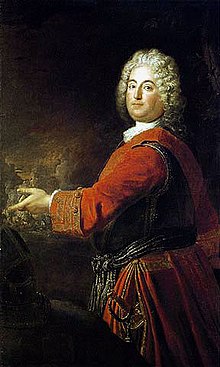Christian Ludwig of Brandenburg-Schwedt



Christian Ludwig zu Brandenburg-Schwedt (born May 24, 1677 in Berlin ; † September 3, 1734 on his Malchow estate ) was Prince of Prussia from the House of Hohenzollern and an officer.
Life
Christian Ludwig was the youngest son of Friedrich Wilhelm, Elector of Brandenburg and his second wife Dorothea Sophie, Princess of Schleswig-Holstein-Sonderburg-Glücksburg, widowed Duchess of Braunschweig-Lüneburg .
Since Elector Friedrich Wilhelm already had an heir to the throne from his first marriage, the then Elector Prince Friedrich , Dorothea Sophie feared for the material well-being of her subsequent children, who were not entitled to Brandenburg - Prussian territories due to the applicable Primogeniture . The descendants of the elector from his second marriage were therefore granted the dominions of Schwedt , Vierraden and Wildenbruch, as well as most of the inheritance of the rich elector Dorothea Sophie. This branch line of the Brandenburg Hohenzollern, which however had no sovereignty or sovereign rights, was named after their residence, which they later expanded in baroque style, Brandenburg-Schwedt . Due to previous investiture of Hohenzollern to total hand and old princely inheritance for all children was also the title of Marquis to that following the acquisition of the Prussian royal crown in 1701 by the nunmehrigen Frederick I to the title of Prince of Prussia was expanded. Head of the line, however, was Christian Ludwig's brother Philipp Wilhelm - he only had a financial share in the apanage and the right to the successor for himself and his descendants in the event of the Schwedt main line or even the spa or later royal line becoming extinct - however, such a case never occurred.
After the death of his half-brother in 1713, his son Friedrich Wilhelm I , Christian Ludwig's nephew, succeeded him on the throne. He pursued a rigid austerity course, abolished the elaborate court keeping and the sumptuous ceremonies of his father and predecessor and used the funds freed up to increase the army , which made him known as the soldier king. Musically, he was at most devoted to a few works by George Frideric Handel .
However, the king allowed his uncle Christian Ludwig, who had a great interest in music and the arts, to keep his own chapel in the Berlin City Palace and gave him the reigns of Malchow and Heinersdorf - these were brought by Christian Ludwig along with his income from his maternal inheritance , his officer license as major general (since 1695) and later lieutenant general in Stettin and as head of the regiment on foot (1806: No. 7) as well as his office as commander of the Coming Lagow and administrator and Protestant cathedral provost of Halberstadt for the year 1734 48,945 thalers alone a.
He was also the fourth recipient of the Prussian Order of the Black Eagle . In the winter of 1718/19 Johann Sebastian Bach visited the city of Berlin and impressed the music enthusiast Christian Ludwig with his skills. Christian Ludwig asked Bach for some of his compositions and in the spring of 1721 received a score entitled “Six Concerts avec plusieurs instruments” , which is now known as the “ Brandenburg Concerts ” .
Christian Ludwig died childless at his Malchow manor and was buried in the crypt of the Berlin Cathedral .
swell
- Schwedt.de/Geschichte ( Memento from September 27, 2007 in the Internet Archive )
- Geschichte-Online.de
- Preußenweb.de / Regiments of the Prussian Army
- Descendants of Johann Sigismund, Elector von Brandenburg ( Memento from May 11, 2008 in the Internet Archive )
- Explanation on Pesne's painting by Christian Ludwig
| personal data | |
|---|---|
| SURNAME | Christian Ludwig of Brandenburg-Schwedt |
| ALTERNATIVE NAMES | Christian Ludwig Margrave of Brandenburg-Schwedt |
| BRIEF DESCRIPTION | Prussian officer, governor of Halberstadt, recipient of Bach's Brandenburg concerts |
| DATE OF BIRTH | May 24, 1677 |
| PLACE OF BIRTH | Berlin |
| DATE OF DEATH | September 3, 1734 |
| Place of death | Malchow |